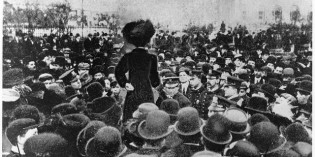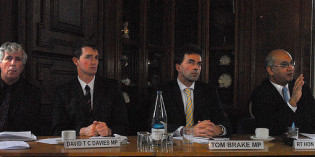Author Archive: democraticaudit

Designing a new UK-EU relationship and how it could be achieved
The Eurozone crisis has brought the EU’s division into two types of membership into relief, with the euro member states moving closer towards deeper fiscal and economic union, and the others, such as the UK, who remain in the single market with no wish to join the Eurozone, at risk of becoming ‘second class’ states. Damian […]

Profumo 50 years on: The old establishment’s collapse has not increased participation
Wyn Grant looks back at the Profumo affair and suggests that it represented the beginning of the end for the old ‘establishment’. In the place of ‘club government’, a more rule bound regulatory state was created. However this transformation has been arguably incomplete, with politicians still being drawn from a narrow range of occupations and not being representative of […]

There should be greater public involvement in deciding what is a legitimate ‘nudge’
The coalition government has been at the forefront of using insights from behavioural research to craft more effective policies, ‘nudging’ citizens in other words. Rikki Dean argues that ‘nudges’, especially those that rely on deception or concealment, should be subject to a ‘participatory principle’. Only citizens themselves can legitimately rule on what is in their own interest, and […]

The constitutional mess that now undoubtedly exists demands urgent review and reform
Matthew Flinders finds that it is not that people don’t care about British politics and its constitutional arrangements but that they simply don’t understand where power lies or why.This has resulted from reforms having been implemented in a manner that is bereft of any underlying logic. There is an urgent need to look across the constitutional landscape in order […]

England needs an influx of young, diverse councillors
Local councils continue to be a stronghold for older, retired, white men, where youth and diversity are often considered cause for suspicion rather than a resource of which to draw. Samir Jeraj, a former young Councillor himself, looks at the arguments for giving local government in the UK a shakeup, with an influx of fresh, […]

Book Review: On Voter Competence
A half century of research shows that most citizens are shockingly uninformed about public affairs, liberal-conservative ideologies, and the issues of the day. This has led most scholars to condemn typical voters and to conclude that policy voting lies beyond their reach. On Voter Competence breaks sharply from this view, with author Paul Goren providing analysis of opinion data from […]

Children with politically engaged parents are more likely to deviate from their parents’ political views in adulthood
How do the political attitudes of parents influence those of their children? As Elias Dinas notes, a common assumption is that children from more politically engaged families are more likely to retain their parents’ political views. Taking issue with this perspective, he finds evidence that while young people from politicised homes may be more likely to acquire […]

Book Review: Political Parties in Britain by Matt Cole and Helen Deighan
This introductory textbook examines the factors contributing to parties’ fortunes and identities, and the causes of recent changes in both. It examines Britain’s main and minor political parties as well as peripheral parties like the BNP and UKIP. Eunice Goes contends Political Parties in Britain is a highly informative, accessible and up-to-date introductory text that should be included in […]

We need more trust in political leaders and more community engagement alongside a measured dose of healthy scepticism
Matthew Flinders suggests that the idea that we should not be too trusting of leaders is simplistic. He argues that, though we should not set people or institutions up to the heights where they cannot do anything but fail, it would be quite wrong to suggest that individuals cannot make a positive difference, or to deny that some politicians […]

How will the coalition end? Cameron and Clegg may look to the precedent set by the 1945 caretaker government
Alun Wyburn-Powell provides a historical account of the 1945 caretaker government and argues that it provides a useful model for thinking about when the current coalition might end. Whilst obviously very different situations, there is good logic in parting some months prior to the start of the 2015 campaign for both the LibDems and Tories. It would […]



 Democratic Audit's core funding is provided by the Joseph Rowntree Charitable Trust. Additional funding is provided by the London School of Economics.
Democratic Audit's core funding is provided by the Joseph Rowntree Charitable Trust. Additional funding is provided by the London School of Economics.